Finance & IT Email Marketing: A Data-Driven Approach
February 2, 2026
Home >> Mobile App Development >> App Development Costs in 2024: A Detailed Guide
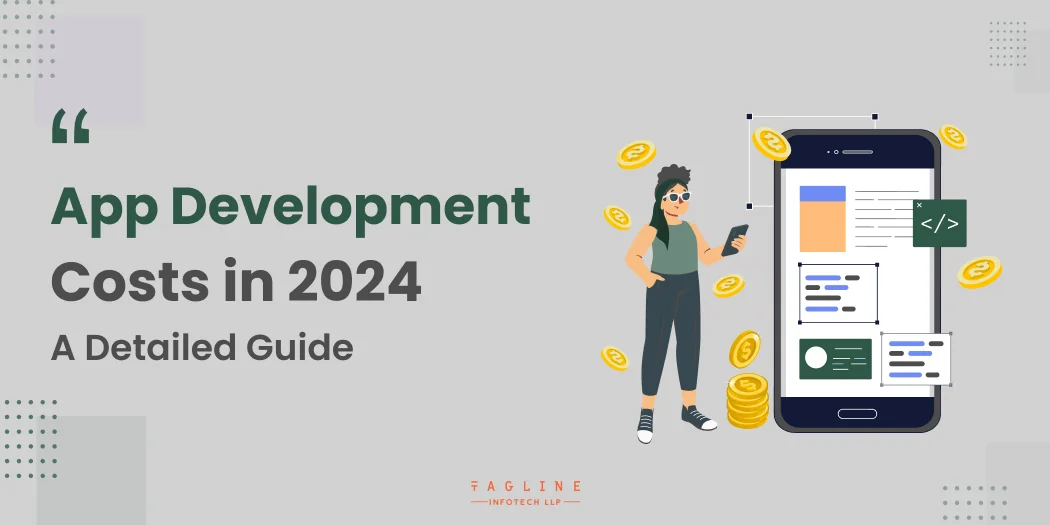
Quick Summary
Ever heard the saying, “there’s an app for everything”? It’s true. Businessofapps reports that Google Play Store boasts 3.3 million Android apps, while the Apple App Store offers around 2.2 million apps.
Moreover, Grand View Research forecasts that mobile app market revenue will hit approximately $567.19 billion by 2030.
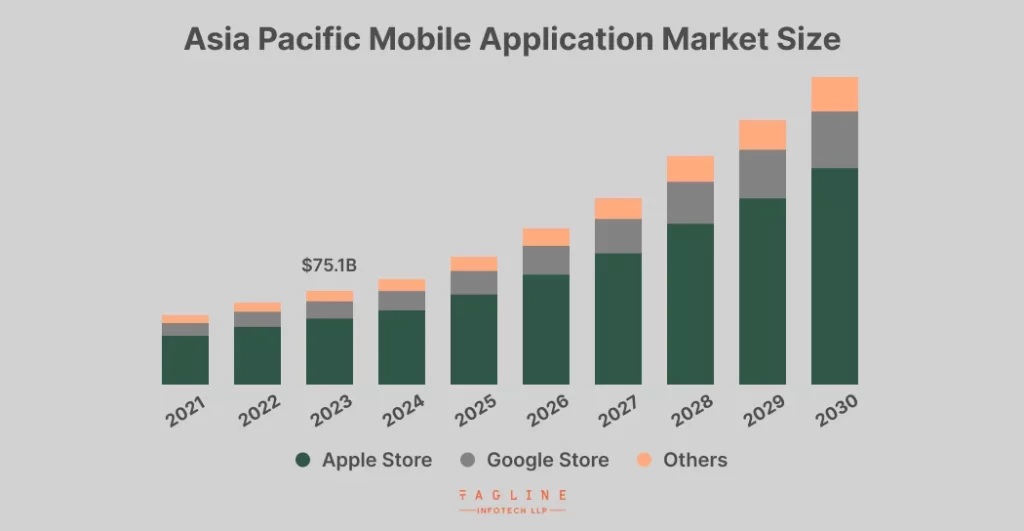
With such booming popularity, it’s no wonder that digital businesses are heavily investing in mobile app development. A common question that arises is, “How much does mobile app development cost?”
This guide will provide a comprehensive answer, covering the factors that influence app development costs, various monetization models, the mobile app development process, and tips for saving money on your mobile app project.
The cost of building an app in 2024 depends largely on its complexity. Whether your app is simple, basic, or complex, the number of features, integrations, and the tech involved will impact the price. Here’s a general breakdown:
The best way to get a clearer idea of what your app might cost is to speak with mobile app developers directly. If you don’t have a development partner yet, using an app cost calculator can help provide an initial estimate. If you are looking to Hire mobile app developers, engaging with them early can provide valuable insights into potential costs and project scope.
However, keep in mind that without clear documentation and details, estimates from development studios will likely be rough guesses. Accurate estimates come from considering multiple factors, such as:
When it comes to mobile app development, hourly rates can vary based on factors like:
Every app is different, so getting a detailed consultation with your development team is key to budgeting accurately. At Tagline Infotech, we carefully estimate the cost by evaluating each of these aspects to ensure a clear and accurate quote.
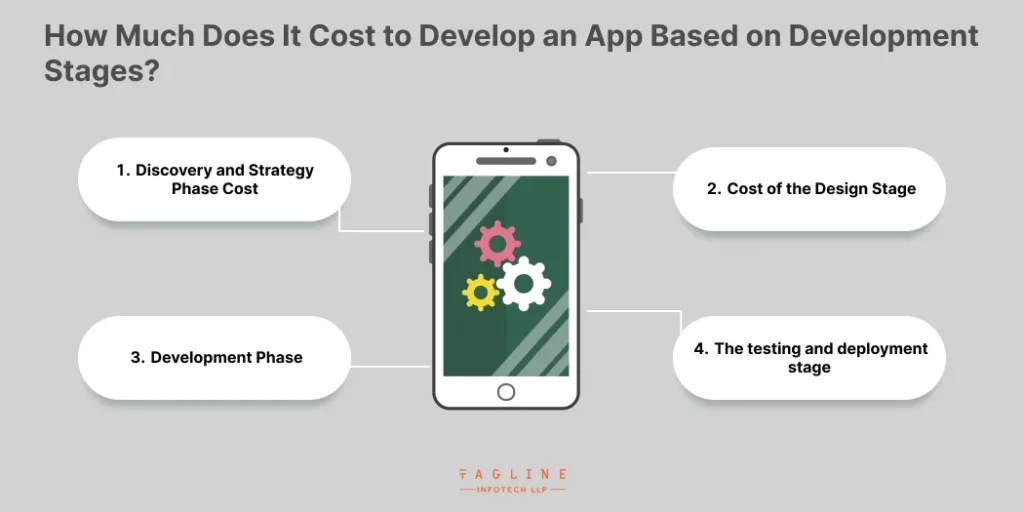
You may have searched online for mobile app development cost estimates or used calculators to get a rough idea. While these figures can seem useful, they are often misleading. The actual cost of developing an app depends on factors like features, technology, design, and the development team’s location.
To provide a clearer view, here’s a breakdown of the costs involved in each stage of mobile app development, so you know exactly where your budget is going.
The discovery or strategy phase is critical in laying a solid foundation for your app development. This includes comprehensive research, planning, and market analysis. A reliable app development company will ask you detailed questions about your business goals and app vision during this process. If not, It can indicate problems that may occur later.
Typically around 10% of the overall app development cost is spent in this phase. This can take anywhere from 20 to 200 hours. The final deliverable should cover:
Estimated Cost: $1,200 – $11,000
Timeframe: 2-4 weeks
The design stage of app development involves creating prototypes, wireframes, user experience (UX), and visual interface (UI) design. A strong first impression is crucial, so having a visually appealing and user-friendly app can greatly impact its success.
It’s important to allocate resources to this stage, as good design can significantly enhance the user experience. Typically, this phase takes up about 10-15% of the total development cost. The time and expense can vary depending on the number of screens, custom features, and overall design complexity.
Estimated Cost: $2,500 – $10,000
Timeline: 3-4 weeks
The development phase is the most critical and costly part of app creation. The complexity of features directly impacts the cost and time required. Key focus areas include app architecture, data security, storage, user base, and third-party integrations.
This stage demands close collaboration, as coding takes up the largest portion of the budget. Opting for cross-platform mobile app development frameworks can reduce costs compared to developing separate apps for each platform.
Estimated Cost: $3,000 – $60,000
Timeline: 2-6 months
The testing and deployment stage is crucial for ensuring your app’s quality before launch. This phase is essential for preventing costly post-launch fixes, as thorough testing helps identify and resolve issues early on.
A dedicated quality assurance team will rigorously evaluate the app, minimizing the likelihood of crashes, glitches, and delays for users. The goal is to provide a smooth experience from the start, enhancing user satisfaction.
The overall cost for testing and deployment varies based on your app’s complexity and features.
Estimated Cost: Less than $5,000
Timeline: 2-4 weeks
When developing a mobile app, picking the right platform is key to managing your costs effectively. Your decision to go with iOS, Android, a Web App, or a Cross-platform solution significantly impacts your budget. For startups that may not have extensive funding, it’s often wise to launch on just one platform at first. As your app gains popularity and your resources increase, you can then explore expanding to additional platforms, allowing for growth without overwhelming expenses.
The type of application you select can significantly impact your development costs. For instance, mobile apps usually require separate development for both iOS and Android, which can increase complexity and expenses. Applications can generally be categorized in the following ways:
Native app development is the process of creating applications designed specifically for one platform, such as iOS or Android. This approach uses platform-specific programming languages, including Swift for iOS and Kotlin for Android. Consequently, the costs for native app development can vary widely, ranging from $10,000 to $250,000, depending on factors like the app’s complexity, features, and developer rates.
Cross-platform app development uses advanced frameworks like Flutter or React Native to create applications that function across various platforms from a single codebase. This method tends to be more cost-effective than native development, with costs typically ranging from $20,000 to $150,000.
Web app development involves building applications designed to run in web browsers on a variety of devices. The cost to develop a web app usually falls between $10,000 and $100,000, with additional ongoing expenses for hosting and maintenance.
Progressive Web Apps (PWAs) integrate the features of both web and mobile apps, delivering a near-native experience through web browsers. Developing a PWA generally costs between $15,000 and $100,000, with extra considerations for offline functionality and app-like features.
The expenses associated with app development can differ based on its complexity and target operating system. Here’s an overview of cost estimates for various platforms:
Developing apps for Apple devices with the iOS operating system involves using languages like Swift or Objective-C. The development costs for iOS apps typically range from $25,000 to $250,000, depending on the app’s complexity, features, and the developer’s rates.
Creating apps for Android devices requires using languages such as Java or Kotlin. Costs for Android app development generally start at $20,000 and can go up to $250,000 or more, especially for more sophisticated applications.
Developing apps for Microsoft Windows devices usually falls within the range of $20,000 to $200,000. The cost can increase for more detailed and tailored applications designed for the Windows platform.
Here’s a simple overview of app development costs based on technology:
Using the React Native framework, developers can create cross-platform apps for both iOS and Android. Building these apps usually starts at around $20,000 and can go up to $150,000, depending on how complex the app is and what features it includes.
Developing apps with Flutter generally costs between $15,000 and $200,000, depending on the project’s size and target audience. Expect to pay between $8,000 and $60,000 for basic apps. If you want something with moderate complexity, the cost will likely fall between $60,000 and $120,000. Highly complex apps with many integrations can range from $140,000 to $200,000.
Swift is used to create native apps specifically for iOS devices. The cost of developing these apps typically ranges from $10,000 to $250,000 or more, especially for those with advanced features tailored to the iOS platform.
Estimating app development costs involves three crucial considerations:
The cost varies significantly based on the app’s type. Simple applications typically range from $20,000 to $60,000, while more complex applications, such as eCommerce or healthcare solutions, can start at $80,000 and exceed $250,000. Features, functionality, and target audience contribute to the final pricing.
Your choice between hiring an agency or freelancers will influence the budget. Freelancers may charge lower rates (around $20/hour), but they often lack the comprehensive support provided by agencies. Development agencies, while more expensive, offer benefits like project management, accountability, and quality assurance, leading to higher quality outcomes within a shorter timeframe.
The intricacy of your app directly impacts the cost. Basic apps with fundamental features can fall within the $20,000 to $60,000 range. Mid-level apps that include various integrations might cost between $50,000 and $200,000, while highly complex applications can surpass $350,000.
By grasping these elements, you can create a more accurate app development budget.
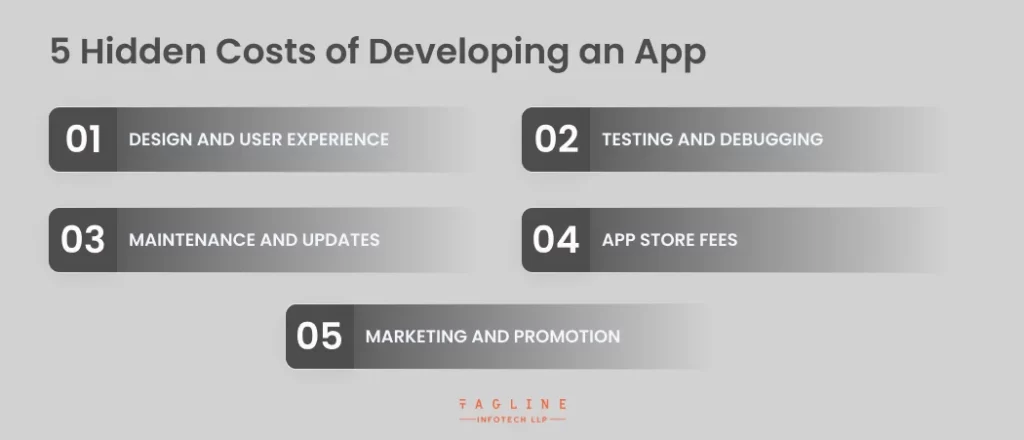
While the initial development costs of an app are often the most apparent, there are hidden expenses that can add up over time. Here are five hidden costs to keep in mind:
Building an app with a polished design and intuitive user experience requires considerable design work. This includes creating user interfaces, icons, and other visuals. Hiring a professional designer can quickly increase costs, especially if your app requires a high level of customization.
Once development is complete, thorough testing on various devices and platforms is necessary to ensure smooth functionality. Identifying and resolving any bugs or issues can take significant time and effort, adding to the overall development budget.
Keeping your app functional and up-to-date requires consistent maintenance and updates. This involves fixing bugs, improving features, and adapting to evolving technologies. Over time, these ongoing updates can become a major part of your app’s overall expenses.
Distributing your app through platforms like the Apple App Store or Google Play comes with associated fees. These can include costs for each download, subscription models, or other charges, which can add up significantly over time.
Simply launching your app isn’t enough—effective marketing is crucial to reaching your audience. This includes creating online profiles, running ads, and promoting your app. These marketing efforts often continue even after the app is live, further contributing to the overall cost.
Building a great app can bring your business vision to life, but it’s important to manage your budget effectively. Here are some simple ways to control costs and get the most out of your investment:
1. Define Your App’s Scope Clearly: Before starting, make sure you know exactly what your app needs to do. A clear plan helps avoid changes that can delay the project and increase costs.
2. Outsource Development: Hiring a third-party development team, especially from countries with lower labor costs, can be a cost-effective option. Outsourcing helps you save money without compromising on quality.
3. Hire the Right Team: Choose a team with experience in similar projects. This will help prevent mistakes and save time and resources.
4. Use Open-Source Tools: Open-source software can lower costs by eliminating the need for expensive licenses, helping you stick to your budget.
5. Prioritize Important Features: Focus on developing the most crucial features first. This approach saves money and gets your app to market faster.
6. Test Early and Often: Regular testing throughout development catches issues early on, saving time and preventing expensive fixes later.
7. Use Development Tools: App development tools and frameworks can speed up and make the process more efficient, cutting down on time and cost.
8. Focus on User Experience: A great user experience can boost engagement, leading to more satisfied users and better returns on investment.
9. Adopt Agile Development: Agile methodologies help you develop in small steps, making it easier to control costs and adjust as needed.
Following these tips, you can build a quality app while staying within your budget.
Here are examples of some popular apps that have reshaped customer experiences and grown into industry leaders. Below is a cost breakdown for creating similar apps, based on their features, design, and complexity:
Amazon leads the digital marketplace with an impressive network of over 1.9 million sellers and more than 300 million active customer accounts worldwide. With a legacy spanning over 20 years, it has become a cornerstone of the e-commerce sector, providing a vast array of products, from electronics to groceries, through its continually updated app. The estimated cost to develop an e-commerce application like Amazon generally ranges from $40,000 to $300,000, influenced by the specific features and functionalities desired.
Zoom has become a widely recognized platform for video conferencing, ideal for virtual meetings and webinars. It allows users to join sessions using unique links or IDs and includes features like screen sharing, document collaboration, and high-quality video and audio communication. Building a video conferencing app like Zoom could cost between $30,000 and $200,000, depending on the complexity of features and functionality you need.
Airbnb has gained widespread popularity in the travel industry as a platform where property owners can offer their spaces for short-term rentals to travelers. Hosts set flexible pricing based on factors such as location, amenities, and seasonal demand, allowing travelers to find accommodations that suit their preferences. The cost to develop an app like Airbnb typically falls between $40,000 and $300,000, depending on specific requirements and desired features.
Since its debut in September 2016, TikTok has become a dominant force in the social media world. It allows users to easily create, watch, and share short, engaging videos. With over 1.58 billion monthly users globally, TikTok has solidified its role in the entertainment industry, where users spend hours either making creative content or enjoying what others have posted. Its phenomenal growth has drawn the attention of many entrepreneurs interested in building similar apps. Developing an app like TikTok generally costs between $20,000 and $250,000, depending on the complexity and features included.
WhatsApp has established itself as a leading app for instant communication, offering real-time messaging and calls. It’s available on all major mobile platforms and is well-known for its robust features, high performance, easy-to-navigate interface, and customizable settings. The cost of developing a messaging app like WhatsApp can range from $50,000 to $500,000 or more, depending on the features and technologies implemented.
Spotify is a top choice for music streaming, offering a comprehensive selection of songs, podcasts, and videos from artists around the globe. While users can access basic features such as music playback and playlist creation for free, upgrading to Spotify Premium provides an ad-free experience and additional exclusive perks. The cost to develop a music streaming app similar to Spotify for both Android and iOS typically ranges from $45,000 to $250,000. This range is influenced by various factors, including app design, complexity, and specific functionalities.
PayPal has positioned itself as one of the most trusted finance apps, offering users a convenient way to store funds and manage transactions without the need for traditional banks. It includes a wallet feature that lets users hold money before transferring it to a bank account or making payments. Serving as both a payment gateway and merchant account, PayPal streamlines online transactions. The cost of developing a PayPal-like app typically ranges from $150,000 to $300,000+, depending on various factors such as the app’s functionality, complexity, and chosen platform.
ZocDoc revolutionizes the way patients schedule doctor appointments by prioritizing user experience. This innovative platform connects individuals with healthcare providers, making it easy to find and book appointments. ZocDoc serves as a comprehensive resource for patients seeking convenient access to various medical professionals. When developing a healthcare appointment app similar to ZocDoc, the estimated cost typically ranges from $100,000 to $150,000, particularly if you plan to incorporate advanced features such as artificial intelligence.
DoorDash is a prominent food delivery service known for its easy-to-use mobile app that makes ordering meals straightforward. The app can be downloaded at no cost, though users can opt for a premium subscription to access additional benefits. Customers are responsible for paying for their meals, along with any associated service fees and tips. Creating a food delivery app similar to DoorDash generally costs between $100,000 and $180,000, with the final amount depending on the specific features and functionalities integrated into the app.
Tinder is the go-to app for online dating, boasting an impressive one billion swipes each day. As a trailblazer in the dating app industry, Tinder offers a straightforward mechanism where users swipe right to express interest in potential matches. While anyone can join for free, Tinder also provides premium subscription options for enhanced features. The development cost for creating an app like Tinder can vary significantly, typically falling between $25,000 and $120,000, depending on the complexity and specific functionalities desired.
Udemy stands out as a highly popular online education marketplace, with more than 70 million learners and 220,000 courses available. This platform empowers instructors to create courses on various subjects, offering tools to upload videos, presentations, PDFs, source code, and other materials that enhance the learning experience. Creating an e-learning application similar to Udemy can cost between $75,000 and $250,000, depending on the level of customization and features included.
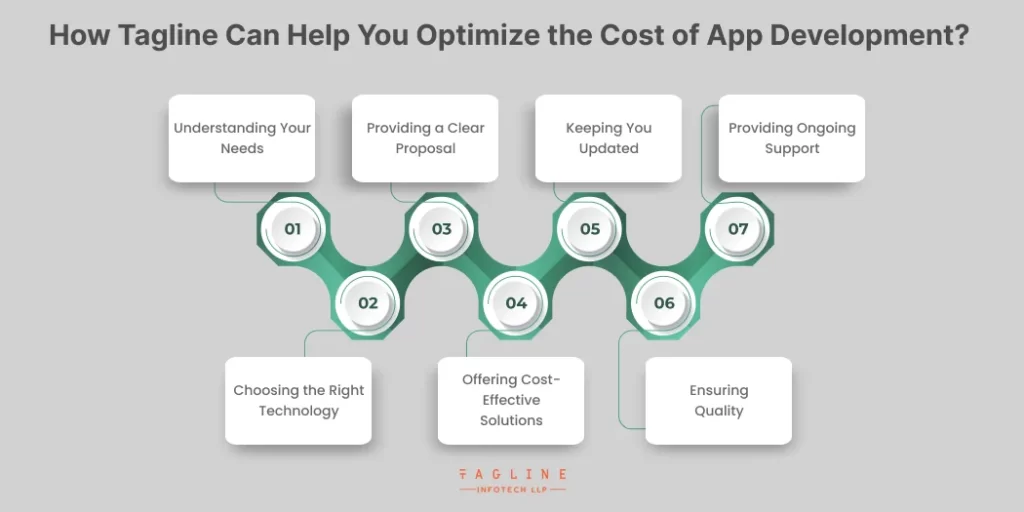
Finding a reliable mobile app development company can be tough with so many choices available. At Tagline Infotech, we understand how challenging this can be, and we’re here to make it easier for you. Even if you’re on a tight budget, our skilled app developers can help you create a secure and scalable application. Here’s how we work:
We start by getting to know what you need. We’ll talk about your business goals, target audience, and budget. This helps us create a plan that fits your vision and financial situation.
Our experienced developers will help you pick the best technology for your app. The right choice can affect costs significantly, so we recommend modern tools that can save you time and money.
We believe in being upfront. We’ll give you a detailed proposal that outlines the project scope, timeline, and budget. This way, you’ll know exactly what to expect and where your money is going.
Our goal is to provide you with great value. With our industry expertise, we find ways to keep your development costs down while ensuring high quality.
You won’t have to worry about being out of the loop! We provide regular updates on your project’s progress, so you can keep track and adjust your budget if needed.
Quality is our priority. Our testing team will thoroughly check your app for bugs and ensure it meets all requirements, helping you avoid costly fixes later.
Once your app is live, we continue to support you. We’re here to quickly address any issues, ensuring your app runs smoothly and saving you from future costs.
At Tagline Infotech, we want to make your app development experience smooth and successful. Let’s team up to bring your ideas to life!
When it comes to app development, the average cost typically ranges from $20,000 to $200,000. Several factors influence this price, including the platform (iOS or Android), the app’s features and functionalities, the intended user base, and how complex the app is. In some cases, costs can go as high as $350,000. Generally, building native apps for both iOS and Android tends to be more expensive than creating cross-platform apps.
For apps with basic features, the development cost can be around $32,000.
If your app has moderate complexity, you might expect to pay about $48,000.
For more intricate applications, costs start at around $72,000.
According to a survey, creating feature-rich apps like Tinder, Uber, or Instagram can cost anywhere from $100,000 to $185,000.
The average costs associated with different stages of app development:
By understanding these costs, you can better plan your budget for app development.
The total cost can be from $32,000 for simple apps to over $100,000 for complex ones, averaging between $75,000 and $250,000.
To develop an app, research your idea, create a plan, choose the right technology, design the app, develop and test it, and finally launch and market it.
Developing an app like Google Maps is estimated to cost between $100,000 and $250,000, factoring in features like navigation and integration.
API keys can be free or paid. Some APIs offer free tiers, while others charge based on usage. Always check the specific API’s pricing.

Digital Valley, 423, Apple Square, beside Lajamni Chowk, Mota Varachha, Surat, Gujarat 394101
D-401, titanium city center, 100 feet anand nagar road, Ahmedabad-380015
+91 9913 808 2851133 Sampley Ln Leander, Texas, 78641
52 Godalming Avenue, wallington, London - SM6 8NW